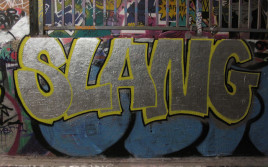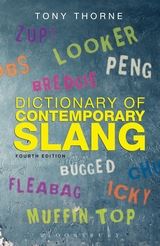Transcript
Podcast produced by Lee Millam
Slang. In this podcast Tony Thorne, former Head of the Language Centre, now Visiting Consultant, at King’s College, London and author of the Bloomsbury Dictionary of Contemporary Slang, looks at what slang is, how it’s used, where it comes from and what words are being used as part of our everyday language.
Slang should be easy to define, but in fact no one has ever come up with a satisfactory definition. Slang is one of the most informal varieties of language, it is usually new, controversial, exotic, often naughty and deviant (or pretends to be).
Probably all languages have had slang, but it was not recorded until the 18th century. It was marginal and taboo, the language of criminals, beggars and tramps.
It is a language that keep the outsiders out (parents, police etc) and using it makes you an insider, part of an exclusive elite. It is often developed in closed communities (prisons, public schools), and by private groups (taxi drivers, soldiers, sailors, criminals) but now that is not the main source of new slang – the internet has introduced something totally new – now most slang is developed by young people from 12 years of age. Words like
- Dench – wonderful
- Moist – awful
- Dint – a stupid, embarrassing person
- CBA – can’t be arsed
- Butters – unattractive
Some slang words have been around for over a hundred years, for example, ‘cool’, ‘dosh’, ‘punk’. Whereas punk has changed its meaning over that time, cool and dosh have stayed roughly the same, which is unusual because mostly slang has to be reinvented to remain exclusive.
Social media have had two main impacts on slang. Firstly they have introduced new language to go with what people do with a medium, eg FaceBook – ‘fraped’, ‘frenemy’, and LOL and OMG. Secondly, social media have enabled slang to spread, indeed we do not know where in the Anglosphere some words have originated – was ‘dint’ first used in Australia, Canada, US, the Caribbean, UK?
Lots of parents and teachers are afraid it is damaging young people’s ability to use standard language, but that is not the case, it is about speech communities who share a language. It does not usually undermine young people’s language ability. Most young people are very good at ‘code switching’, they don’t use slang in a job interview or essay, but they do use it in the club, in the street, in the school playground.
Slang is no longer taboo, it creeps into all the media – newspapers and magazines as well as online media. It is no longer forbidden, it is allowed in the home. And of course we no longer have those authority figures who in the past could proscribe the use of slang. Young people do not any longer listen to the police, the government or parents as a linguistic authority. They have their own domains in which to communicate. Saga has developed an app for the over 50s explaining sports slang to older people.
But old people can feel uncomfortable with all this – they feel they are losing control of language and language is, after all, what gives us our identity. There is a dictionary of ‘granny slang’ with words like ‘galivanting’ and ‘bamboozling’ – words that young people think are slang but are just colloquial expressions used by granny’s generation!
There is no danger in slang as long as we talk about it and analyse it, and it is good to exchange examples of slang between the generations.
__________________
- Picture: Slang graffiti, Leake Street by Duncan C
- Music: Andreas DSP by Jonas and Good Enough by CuzOH
Tags: Anglosphere, Code switching, Dench, language, Linguistics, Slang



Subscribe with…